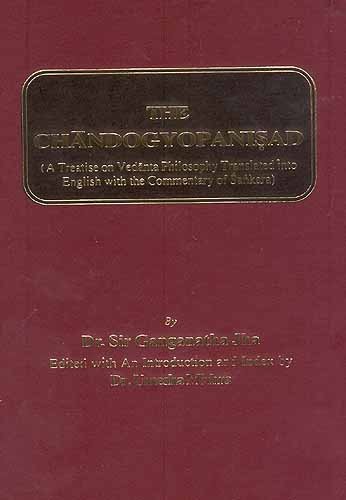Chandogya Upanishad (Shankara Bhashya)
by Ganganatha Jha | 1942 | 149,749 words | ISBN-10: 8170842840 | ISBN-13: 9788170842842
This is the English translation of the Chandogya Upanishad, an ancient philosophical text originally written in Sanksrit and dating to at least the 8th century BCE. Having eight chapters (adhyayas) and many sub-sections (khandas), this text is counted among the largest of it's kind. The Chandogya Upanishad, being connected to the Samaveda, represen...
Section 4.2 (second khaṇḍa) (five texts)
Upaniṣad text:
Then Janaśruti’s great-grandson took with him six hundred cows, necklace, and a chariot with mules and went over, and said to him.—(1)
Commentary (Śaṅkara Bhāṣya):
Then, having understood that the sage was Intending to enter the life of a Householder, and also that he was desirous of acquiring wealth—Janaśruti’s great-grandson took with him six hundred cows, necklace, a chariot with mules—yoked with a pair of mules,—and along with all this wealth, went over to where Raikva was; and having approached him, said to him as follows:—(1)
Upaniṣad text:
‘Raikva, here are six hundred cows, necklace, and a chariot with mules. Now, revered sir, teach me that Deity which you worship’.—(2)
Commentary (Śaṅkara Bhāṣya):
‘O, Raikva, here are these six hundred cows,—brought by me for you,—here is a necklace,—and a chariot with mules; please accept all this wealth, and teach me that Deity which you worship; that is, instruct me regarding that Deity.—(2)
Upaniṣad text:
The other answered him thus—‘O, Śūdra! may this necklace with the chariot and the cows remain with thyself’;—thereupon Janaśruti’s great-grandson again came to him with a thousand cows, a necklace, a chariot with mules and his daughter, and went over to him.—(3)
Commentary (Śaṅkara Bhāṣya):
When the king had said this, the other—i.e. Raikva—answered him thus.—‘Aha’ is a particle generally used to signify resentment; but in the present context, it does not signify anything; as the term ‘eva’ has been used separately (for the purpose of expressing resentment). ‘May this necklace with the chariot—[Hāretvā being formed as ‘Hara’ (necklace) plus ‘itvā’ (chariot)],—along with the cows remain with thee thyself;—let them be with thyself—O, Śūdra’;—the sense is that ‘I have no use for these which are insufficient for my purpose’.
Objection:—“The person addressed was a king, as is clear from the fact that he had a Bard in attendance; as has been said before—‘He said to the Bard Then again, he had approached the Brāhmaṇa (Raikva) for the purpose of acquiring knowledge, to which a Śūdra is not entitled. How then is it that Raikva has adopted an improper form of address ‘O, Śūdra’?”
The revered Teachers have explained this as follows On overhearing the conversation of the flamingoes, the king was struck with sorrow; under this sorrow, (‘śucā’) he heard of Raikva’s greatness, and then became mollified; all this the sage (Raikva) knew, and in order to indicate that he had supernatural powers to read the thoughts of other persons, he addressed the king as ‘shūdra’ (applying this name to him in the etymological sense of mollified through sorrow); or his purpose may be to express displeasure at the king having come to him for acquiring knowledge, through gifts only, and not through service,—thus behaving improperly, like a Śūdra. He did not mean that the king was a Śūdra by caste.
Others have offered the following explanation:—The king had brought a small quantity of wealth, hence in anger the sage addressed him as ‘shūdra’; as indicating the impropriety of this conduct, there is the text that ‘Wealth should be accepted only when it is offered in plenty’
Therefore, having understood the wishes of the sage Janaśruti’s great-grandson took with him one thousand cows—more—his daughter a fit wife for the sage,—and came to the sage.—(3)
Upaniṣad text:
He said to him—‘Raikva’, here are a thousand cows, this necklace, this chariot with mules, this wife, and this village in which you dwell. Now, revered sir, teach me.—(4)
Holding her mouth, he said,—‘Thou hast, O, Śūdra, brought these; by this mouth alone dost thou make me speak’,—These are the villages named ‘Raikvaparṇā’ in the Mahāvṛṣa country, where he lived.—He then taught him.—(5)
Commentary (Śaṅkara Bhāṣya):
‘O Raikva, here are a thousand cows, this necklace, the chariot with mules, my daughter—for being your wife,—all this has been brought by me;—and this village also where you dwell—this also has been set apart by me for you. Accept all this, and teach me, O revered sir.’
On being thus addressed, the sage, holding the mouth of the king’s daughter who had been brought for being his wife,—i.e. knowing the mouth to be the doorway, the proper channel, for the imparting of knowledge,—according to the declaration that—‘The Religious Student, the giver of wealth, the exceptionally intelligent, the Vedic scholar, a loved person, and learning itself,—these are my six channels, said Knowledge;’ such is the declaration known to have been made by Knowledge.—Knowing this, the sage held her mouth, and said—‘Thou hast brought these, cows and other things,—and thou bast done well’—this has to be supplied, ‘Śūdra’—this form of address is only in accordance with the former address, and has no other signification, as on the previous occasion.—‘It is by this mouth alone’—which is a fit channel of knowing,—‘dost thou make me speak’.—There are the villages known as Raikvaparṇā in the Mahāvṛṣa country, where—in which villages—lived Raikva -Thereupon he taught him,—the Science.—(5)
End of Section (2) of Discourse IV
